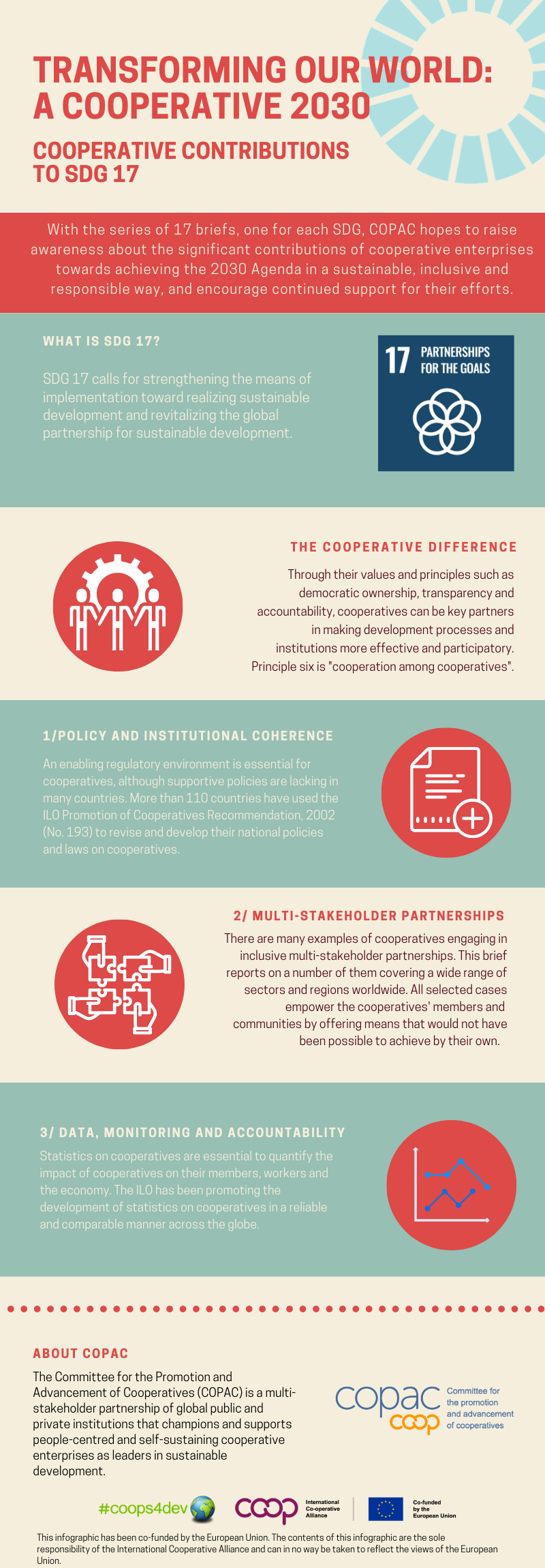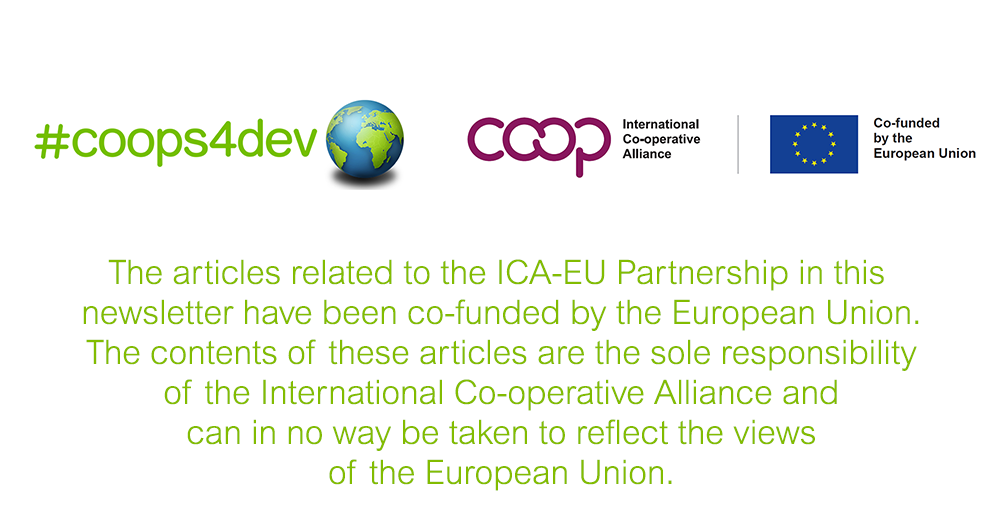
As member of the Committee for the promotion and advancement of cooperatives (COPAC), the ICA has been the lead author of the latest briefs of the COPAC’s series “Transforming our world: A cooperative 2030”. This last edition is devoted to cooperatives’ contributions to Sustainable Development Goal (SDG) 17: “Partnership for the Goals” and the writing process has been guided by the ICA-EU Partnership on cooperative development (#coops4dev), which is “per se” a great example of partnership.
The series of briefs “Transforming our world: A cooperative 2030” elaborated by COPAC aims at raising awareness about the fundamental contribution of cooperatives in the achievement of the UN’s Agenda 2030.
What is SDG17?
The Sustainable Development Goal 17 (SDG 17) is the last of a list of SDGs conforming the 2030 Agenda for Sustainable Development’s blueprint. It calls for strengthening the means of implementation towards realizing sustainable development and revitalizing the global partnership for sustainable development through 5 areas of action:
- Finance
- Information and communications technology
- Capacity-building
- Trade
- Systemic issues: Policy and institutional coherence / Multi-stakeholder partnerships / Data, monitoring and accountability
How do cooperatives contribute to SDG 17?
Particularly in the current health emergency situation due to the COVID-19 pandemic, the value of partnerships becomes more vital than ever – the global health, economic and social crisis caused by COVID-19 can only be tackled through international and multilateral cooperation. In this context, cooperatives can play an important role at the global and local stages given the fact that the idea of partnership and collaboration is at the cooperatives’ DNA – principle six of the seven cooperative principles is “cooperation among cooperatives”. Through the willingness of cooperatives to collaborate with other cooperatives, partners and stakeholders, a global network of actors operating at local level is built up. Thanks to their values and principles, cooperatives become a reliable partner to implement sustainable development processes in an effective, people-centred and democratic manner.
Focusing on the 3 targets envisioned by the “Systemic issues” area of action – Policy and institutional coherence, Multi-stakeholder partnerships and Data, monitoring and accountability, the paper accounts on the relevancy of these 3 sub-areas for the cooperative movement and provides some examples of organisations and initiatives already working towards its progression, such as the ILO Promotion of Cooperatives Recommendation, 2002 (No. 193), the ILO Guidelines on Statistics of Cooperatives and ongoing collaborations between agricultural and consumer cooperatives to gain fairer and more efficient supply chains.
Eight examples from the field: joining efforts to advancing in the Agenda 2030
The report also offers 8 examples of inclusive bi/multi-stakeholder partnerships including cooperatives from all over the world. The selected cases prove the involvement of cooperatives in cooperating with international and national organisations and stakeholders from different sectors (e.g. agriculture, consumers’ and finance cooperatives) to advance in the implementation of the Agenda 2030 with an important focus on the local communities’ needs and a participatory involvement of the different actors.
One of the reported cases is the ICA-EU Partnership “Cooperatives in development – people-centered businesses in action”, which has been instrumental in facilitating the flow of information, creating a dynamic of advocacy and knowledge sharing through interregional cooperation since its launch in 2016. According to the brief, “more than 140 organizations from 80 countries have participated on thematic trainings [provided by the ICA-EU Partnership] that cover a wide spectrum of development issues including decent work, youth employment, cooperative entrepreneurship and women empowerment.”
As stated by the #coops4dev Policy Coordinator and lead author of the brief, Georgia Papoutsi, “inclusive multi-stakeholder partnerships have been within our scope of work since the very beginning of the ICA-EU Partnership to improve the enabling environment for cooperatives, their capacity to operate effectively as actors of development and cooperate both amongst cooperatives and other development stakeholders. In the latest call for global action of many leaders across the world, given the emergency at social, economic and health spheres, the cooperative movement is standing up to help communities move forward and rebuild better, embracing the value of solidarity!”.






